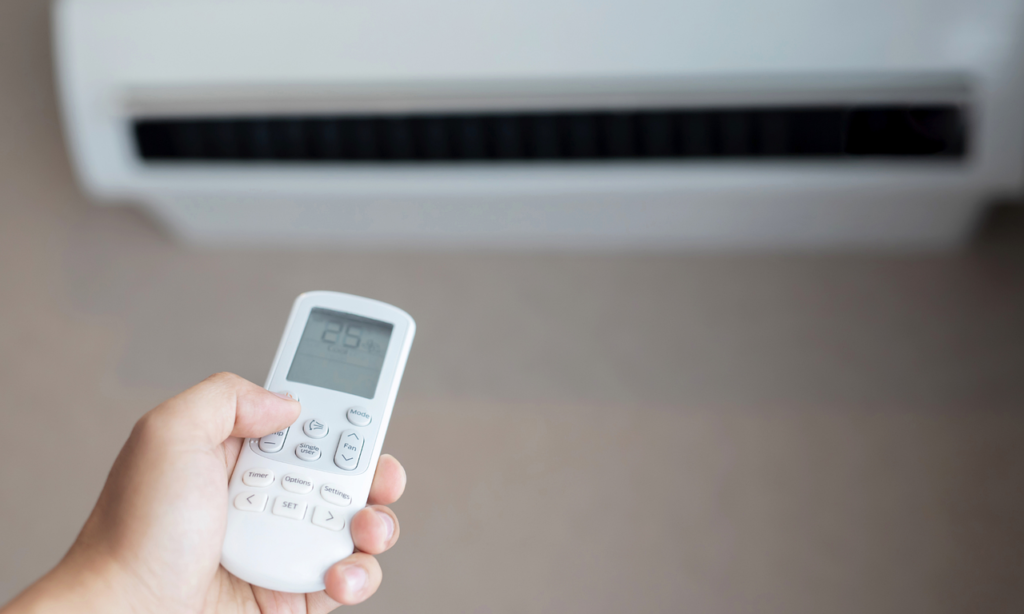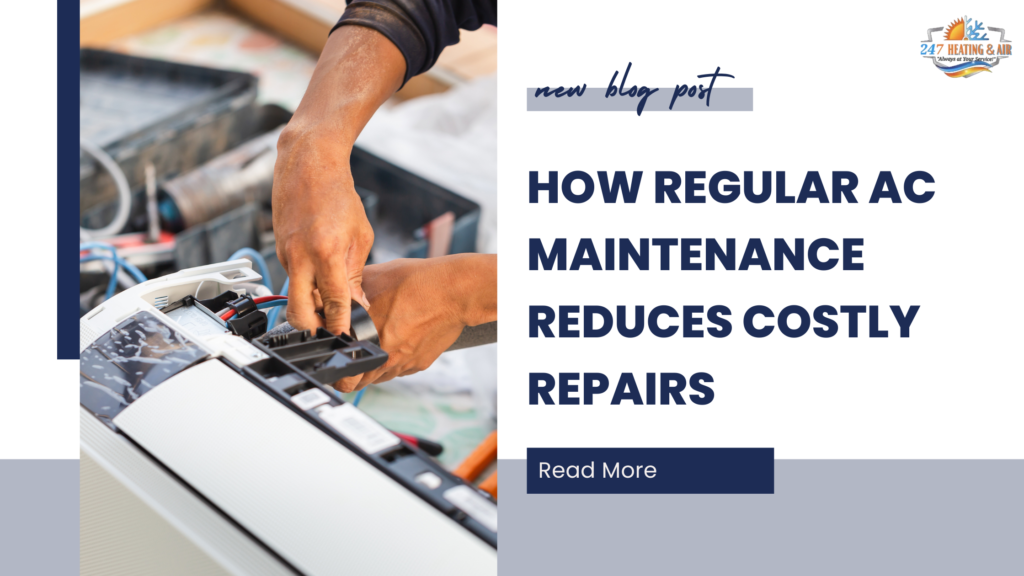- Regular AC maintenance identifies small problems early, preventing expensive repairs and system failures while maintaining energy efficiency for lower operating costs.
- Professional service ensures warranty compliance and extends the lifespan of your AC system, protecting your investment and delivering reliable performance.
- 24/7 Heating & Air, LLC offers detailed maintenance services tailored to your needs, supporting comfort, efficiency, and long-term savings with expert, dependable care.
Air conditioning systems represent a significant investment in both comfort and property value. Many homeowners and businesses expect these systems to operate reliably for years with minimal fuss. Yet, too often, they overlook the most practical step to extend system life and avoid surprise repair bills: regular maintenance.
Professional AC maintenance is more than a quick checkup or seasonal chore. It is a deliberate strategy to minimize risks, reduce operating costs, and keep your system functioning at peak performance. While it can seem tempting to postpone scheduled service to save a few dollars, this approach often leads to expensive emergency repairs, shorter equipment lifespan, and even safety concerns.
This article explores how regular AC maintenance reduces costly repairs in a real, measurable way. From identifying issues before they escalate to preserving efficiency and safeguarding warranties, each aspect underscores the wisdom of a proactive approach.
Understanding AC System Complexity
An air conditioning system is a network of mechanical and electrical components that must work together seamlessly. Compressors, evaporator coils, fans, thermostats, sensors, condensate drains, and refrigerant lines all play a role in maintaining comfort.
Neglecting any part of the system can lead to strain on other components. For instance, a clogged filter seems minor but can reduce airflow, forcing the compressor to work harder. Over time, this added workload leads to overheating or even failure.
Similarly, low refrigerant levels can freeze coils or damage the compressor, while blocked drains may lead to water damage or mold. Each of these issues is preventable with routine inspection and service.
Regular maintenance isn’t about unnecessary tinkering; it is about understanding the complexity of your AC system and respecting the engineering behind its reliable performance.
The Value of Early Problem Detection
One of the clearest ways maintenance reduces repair costs is by catching issues early. When trained technicians inspect your system, they recognize subtle signs of trouble that untrained eyes miss.
A slight vibration in the motor, a small drop in coolant pressure, or an unusual sound can reveal an impending failure. Left unchecked, these small issues grow. A worn belt can snap, damaging other parts. A tiny refrigerant leak can expand, requiring a costly refill or even compressor replacement.
Timely detection enables repairs to be simpler, cheaper, and quicker. Preventive service rarely requires emergency parts orders or overnight labor fees. Instead, it addresses problems on your schedule, with minimal disruption.
Protecting Your System’s Efficiency
Another overlooked benefit of maintenance is maintaining efficiency. Over time, dust and debris accumulate in coils and filters. Refrigerant may leak slowly. Fans can become unbalanced, and electrical contacts can corrode.
All of these changes force the system to work harder to produce the same level of cooling. The result? Higher utility bills and greater wear and tear.
Routine maintenance restores lost efficiency by cleaning, tightening, lubricating, and calibrating key components. This reduces energy consumption and prolongs the system’s life by lowering the overall strain.
Think of maintenance as an investment that pays you back monthly. Instead of overpaying on energy bills or facing surprise breakdowns, you enjoy consistent performance at lower operating costs.
Warranty and Manufacturer Requirements
Many homeowners don’t realize that skipping maintenance can void their manufacturer’s warranty.
Manufacturers understand the importance of regular service in preventing major failures. That’s why they often include maintenance requirements in warranty terms. If a system fails under warranty but records show maintenance was skipped, the claim may be denied.
This can turn what should be a covered repair into a personal expense of hundreds or thousands of dollars.
By scheduling regular maintenance and keeping proper records, homeowners preserve their warranty coverage. This ensures that if a covered component fails, they receive the full value of their protection.
Preventing Major Component Failures
While some AC issues are inexpensive to fix early, they become major expenses if ignored. For instance:
- A dirty condenser coil causes higher pressure in the system, which can lead to compressor failure. Replacing a compressor is one of the most expensive AC repairs.
- Blocked drain lines can overflow and damage ceilings, walls, and floors, adding repair costs beyond the HVAC system.
- Electrical problems, if not corrected, can cause short circuits or even fires.
By preventing these problems, maintenance saves not only the cost of parts but also labor, property damage, and potential safety risks.
Maintenance is proactive risk management, protecting homeowners from the kind of emergencies that always seem to arrive at the worst possible time.
Extending System Lifespan
Air conditioning systems are designed to last a certain number of years, but that lifespan assumes proper care.
Without maintenance, systems accumulate dirt, wear, and minor damage that shortens their useful life. A system that should last 15 years might fail after 10, forcing early replacement costs.
Maintenance helps owners reach, or even exceed, expected lifespan. This defers major capital expenses and improves return on investment.
When considering the cost of a new AC system, investing a fraction of that amount in regular service is a wise financial move.

Reducing Emergency Service Calls
One of the most stressful and expensive ways to maintain an AC system is to skip regular maintenance and wait until it fails.
Emergency calls often come during peak demand, the hottest days of summer, when contractors are booked solid. This can mean higher service fees, limited availability, and days without cooling.
Preventive maintenance reduces the likelihood of these emergencies. Technicians can identify and correct emerging problems during scheduled visits, avoiding urgent repairs when the system is under the heaviest load.
This approach is less stressful, more predictable, and often far cheaper over the life of the system.
Supporting Indoor Air Quality
AC systems do more than cool air; they also filter it. Dirty filters and coils can circulate dust, allergens, and even mold spores throughout the home.
Regular maintenance ensures filters are changed, drains are clear, and coils are clean. This protects indoor air quality, which is particularly important for those with allergies, asthma, or other respiratory concerns.
While air quality might seem unrelated to repair costs, it plays a role. A dirty system has to work harder, increasing the risk of breakdowns. Additionally, avoiding health-related repairs, like cleaning mold damage from ducts, is an often-overlooked benefit of consistent maintenance.
Budgeting Predictability
Major repairs and system replacements rarely arrive with convenient timing.
Maintenance transforms HVAC costs from unpredictable emergencies into manageable, planned expenses. Instead of facing sudden $2,000 repairs, homeowners can plan for modest, scheduled service fees.
This budgeting predictability is especially important for property managers and businesses that need to control operating costs.
A predictable maintenance schedule also helps companies avoid business disruptions due to AC failure during busy periods.
Supporting Environmental Responsibility
While cost is a primary concern, maintenance also supports environmental goals.
A well-maintained system uses less energy, reducing the carbon footprint of cooling. Preventing refrigerant leaks avoids releasing greenhouse gases into the atmosphere.
Extending system life also reduces the need for manufacturing, transporting, and disposing of new units, all of which have environmental impacts.
For those seeking sustainable practices, maintenance represents an easy, impactful step.
Why Professional Service Matters
Some homeowners think they can skip professional maintenance by cleaning or inspecting parts themselves. While owner involvement, like changing filters, is valuable, professional service offers more.
Technicians have specialized tools, training, and diagnostic skills. They can measure refrigerant pressure accurately, test electrical components under load, and spot early signs of wear or failure.
They also know manufacturer specifications and can maintain warranty compliance.
Professional maintenance isn’t about upselling unnecessary work. When provided by reputable companies, it’s a transparent, detail-oriented service designed to save money and trouble over time.
The Risk of Deferred Maintenance
Deferred maintenance is an easy trap. Busy schedules, tight budgets, or simple procrastination can push service off the calendar.
Yet, each skipped appointment compounds risk. Dirt accumulates, small issues worsen, and efficiency drops. Instead of paying modest maintenance costs, owners face major repairs, high utility bills, and shortened system life.
Businesses can also see employee productivity drop if comfort levels decline.
Understanding these risks reframes maintenance from an optional luxury to an essential responsibility of ownership.
Custom Maintenance Plans
The best HVAC companies recognize that every system and property is different.
They often offer customized maintenance plans tailored to system age, usage patterns, and manufacturer requirements. These plans simplify scheduling, offer predictable pricing, and ensure consistent care.
For busy homeowners and property managers, these plans remove uncertainty and help guarantee long-term savings.
Investing in Peace of Mind
Beyond cost savings, maintenance offers something harder to quantify but equally valuable: peace of mind.
A well-maintained AC system is reliable. Owners don’t worry about failures during heat waves, surprise repair bills, or warranty disputes.
They know their property remains comfortable, efficient, and protected.
That confidence has real value, and it is earned through consistent, professional care.
Conclusion
Regular AC maintenance is far more than a seasonal task. It is a deliberate, strategic investment in efficiency, reliability, and cost control.
By detecting problems early, maintaining efficiency, protecting warranties, and extending system lifespan, maintenance reduces the risk of costly, disruptive repairs.
It transforms HVAC ownership from reactive emergency management to proactive care, saving money while delivering comfort and reliability year after year.
For homeowners, property managers, and businesses alike, the case is clear: regular AC maintenance is one of the wisest, most cost-effective steps you can take to protect your investment.
Schedule a comprehensive AC maintenance visit with 24/7 Heating & Air, LLC to support consistent performance and reduce costly repairs. A thoughtful approach keeps your system efficient, safeguards comfort, and helps protect your long-term budget.

